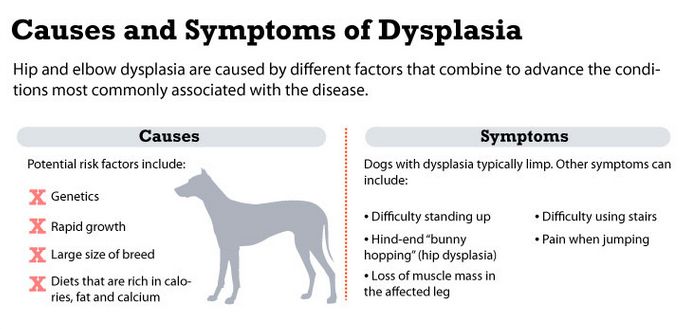 An important consideration when purchasing a Gerberian Shepsky is the health of the dog’s parents, and what types of illnesses to watch for. As a hybrid breed, fewer health complaints can be expected than with a truly purebred dog, however, congenital diseases from either parent are still possible.
An important consideration when purchasing a Gerberian Shepsky is the health of the dog’s parents, and what types of illnesses to watch for. As a hybrid breed, fewer health complaints can be expected than with a truly purebred dog, however, congenital diseases from either parent are still possible.
Listed below are common Siberian Husky and German Shepherd maladies, and what care can be taken to ensure your dog lives the healthiest life possible.
- Hip and Elbow Dysplasia
Although Siberian Huskies have one of the lowest risks of hip and elbow dysplasia among all dog breeds, German Shepherds unfortunately have one of the highest, with approximately 20% of the breed affected. If purchasing your Gerberian Shepsky from a breeder, be sure to inquire about Orthopedic Foundation of America certification to ensure the parent Shepherd is free of joint complaints. While the only preventative measure for hip and elbow dysplasia is good selective breeding, factors such as exercise, soft bedding, good nutrition, anti-inflammatory medications, and nutrition supplements can mitigate the effects of this painful disorder.

- Ocular Diseases
Both the German Shepherd and Siberian Husky are prone to a few serious eye diseases, particularly juvenile cataracts, progressive retinal atrophy (PRA), and canine glaucoma. Unlike cataracts in senior-aged dogs, juvenile cataracts can appear as early as five months old. In severe cases, this condition can result in complete blindness before the dog’s first birthday. Progressive retinal atrophy is most common in male Siberian Huskies and is a disorder affecting the rods and cones of the eyes. Symptoms vary, but decreased vision, eye discomfort, and blindness can occur.
Presently, there is no treatment for PRA. Canine glaucoma describes a number of diseases which affect the optic nerve and also results in loss of vision and blindness. Although serious, canine glaucoma can be treated surgically, if caught early. The hereditary nature of these diseases makes finding a reputable breeder important. Ask to see Canine Eye Registry Foundation (CERF) certificates for both parent dogs. Additionally, talk to your veterinarian about incorporating routine eye exams into your dog’s annual vet visits. The good news is that most of these disorders appear before your dog has reached 5 years of age. Beyond this point, your dog’s risk of inheriting many serious eye disorders is essentially zero.
- Skin and Allergies
Siberian Huskies and German Shepherds are known to exhibit a number of skin allergies or disorders. Commonly, Huskies acquire skin rashes and extreme itchiness caused by their food or environment. Common culprits are wheat, grain, fleas, and pollen. Severe allergies and scratching can lead to Pyoderma, a bacterial infection of the skin. Occasionally, Huskies are diagnosed with Canine Discoid Lupus, which causes damage to the dog’s skin, commonly on the nose. Initially, Lupus may manifest as what appears to be a sunburn (scaly, dry skin and discoloration), but if left untreated the sinuses, gums, lips, and other sensitive areas may experience irreversible damage. Lupus should not be confused with “snow nose,” which is a common occurrence in the winter and is merely the loss of pigment of on the dog’s nose during the cold months.
When in doubt, however, always be sure to consult a veterinarian. Flea sensitivity is also common for Huskies; however some German Shepherds suffer considerable distress when infested with fleas. Be sure to always use flea and tick preventative, and rid flea infestations ASAP to avoid even worse parasites, such as tapeworm.
- Bloat
Bloat can affect all dogs, but deep-chested breeds (such as the Gerberian Shepsky) are more likely to be stricken with this condition. The second leading cause of death in dogs, bloat is extremely serious and describes when a dog’s stomach dilates after becoming filled with fluid or air. Bloat can lead to gastric torsion if the stomach flips over, thus restricting the entrance and exit to the stomach. Symptoms include a large, distended stomach that is hard to the touch, as well as obvious pain. The dog also may be unsuccessfully attempting to throw up. Treatment involves releasing the buildup of air or fluid in the stomach, or in the case of gastric torsion, emergency surgery.
Without immediate treatment, dogs typically do not survive. Bloat can be prevented by limiting the volume or air, food, or fluid in the stomach. Dogs should be fed 2 – 3 smaller meals a day, rather than one large serving. Feeding within an hour of exercise is discouraged, as is allowing dogs to drink large quantities of water immediately following a meal. However, be aware that the exact cause and preventative measures for bloat are not completely understood.
- Epilepsy
An alarmingly typical health issue for Siberian Huskies and German Shepherds is epilepsy, a condition that is characterized by seizures of unknown cause. Canine epilepsy is a frustrating disorder because the frequency, duration, and severity of each episode is never consistent. For Huskies, a possible trigger is zinc deficiency and malabsorption. Huskies commonly suffer from an inability to properly absorb zinc from their diet. Researchers have observed that zinc deficiency in the brain can lead to severe neurological distress, including seizures. Providing your dog with a zinc supplement can decrease his likelihood of developing epilepsy, but be sure to discuss this option with your veterinarian.
- Glandular Disorders
Hypothyroidism and Cushing’s Disease are two disorders which your Gerberian Shepsky may have an increased risk to develop. Both disorders cause glands (the thyroid or adrenal gland, respectively) to under produce necessary hormones. For hypothyroidism, hormone suppression can lead to weight gain, fatigue, lethargy, and a dull coat. A full blood panel can detect a thyroid disorder, and is recommended every two years for early detection.
While hypothyroidism cannot be cured, it can be controlled with medication. Cushing’s Disease is most common in older German Shepherds and is caused by a non-cancerous tumor on the pituitary gland. Symptoms include increased hunger or thirst, weight gain, insomnia, and lethargy, to name a few. Diagnosis includes a urinalysis, blood panel, and possibly an MRI. Like hypothyroidism, Cushing’s cannot be cured, only managed with medication.